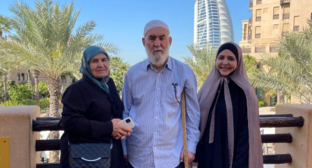13 October 2010, 23:00
Week in the Caucasus: review of main events of October 4-10
Elections to local self-government bodies in the SFD (Southern Federal District) turned into numerous violations, and in Dagestan - into a mass brawl and murder; international organizations focus attention on problems of Southern Caucasus, - look these and other events in the review of the week of October 4-10, 2010, prepared by the "Caucasian Knot".
Russia commemorates Anna Politkovskaya
On October 7 - anniversary of the murder of Anna Politkovskaya, an observer of the "Novaya Gazeta", - Russian regions held memory rallies and actions. Under a rough estimate, about 2000 persons gathered in Moscow, in Chistoprudny Boulevard, near the monument to Griboyedov. In St Petersburg, a similar action took place in Troitskaya Square, near the Solovki Boulder. On October 7 in Ingushetia, the office of the human rights organization "Mashr" also hosted an event in memory of Anna Politkovskaya who was assassinated 4 years ago. The European Parliament paid tribute to Anna Politkovskaya on October 6.
On October 8, the editorial board of the "Novaya Gazeta" in Moscow started bagging subscriptions for commemorating Anna Politkovskaya and renaming the Lesnaya Street, where she lived and was murdered, in her honour.
Elections in the Caucasus did not pass unnoticed
The main last week's political event was the United Voting Day - October 10, when most of the regions in the south of Russia held elections to local self-government bodies.
With complaints but without violations
There were no resonant incidents in the SFD on the voting day. However, independent observers and representatives of the CPRF (Communist Party of the Russian Federation) stated, virtually in all the regions, as experts had forecasted, massive violations admitted at polling stations. Thus, the Krasnodar Territory, where the CPRF called to boycott the elections and announced the intention to file a complaint to the European Court of Human Rights (ECtHR) because they found the elections in the region not in line with legal norms, became the leader among Russian regions by the number of violations. Most complaints arrived from the territorial capital (Krasnodar), where deputies of the City Duma were elected. At the same time, the head of the Krasnodar election commission assured that the City Duma elections passed without essential violations.
The same situation was also observed on October 10 at elections in the Volgograd and Rostov Regions: observers stated revealed violations, while local election commissions reported the absence of serious excesses and complaints.
Brawl at polling station grew into murder
Special attention in Northern Caucasus was again given to elections in Dagestan. Here, Vladimir Churov, head of the Central Election Commission (CEC) of the Russian Federation, came to monitor the election of the head of Derbent. In the end, in Derbent, like in the Dagestani capital Makhachkala, where also the mayor was elected, the voting day passed quietly. However, in the Levashin District of the republic elections turned into a tragedy.
On the voting day, 4598 ballot papers disappeared in Khadzhalmakhi village; a criminal case was initiated on the fact. This incident, according to the militia, caused a mass brawl, in which Abdulmuslim Nurmagomedov, head of the village administration, was killed, and two more persons received gunshot wounds. The casualty was not a candidate at the election, but the conflict broke out at one of the polling stations; then the brawl with participation of up to 500 persons continued in the street.
South Caucasus in the spotlight of world public
Last week saw a noticeable intensification of international organizations aiming to stabilize the situation in Southern Caucasus.
Problems of Armenia and South Ossetia discussed at PACE session
Two regions of Southern Caucasus at the same time were in the focus of attention at the autumn session of the Parliamentary Assembly of the Council of Europe (PACE) that took place on October 6-8.
The PACE Monitoring Commission discussed the draft of reform presented by the Armenian authorities. In the course of debates, the Commission heard the opinions of the Armenian opposition on fulfilment by Armenia of its obligations to investigate the events of March 1-2, 2008. On the last day of the session it was announced that the pre-planned October visit to the country of the Co-Rapporteurs of the PACE Monitoring Commission on the issue of Armenia was postponed till some later time.
Besides, in the course of the session, the Key Commission of the Assembly for monitoring the situation in South Ossetia again failed to decide on closing the Russian-Georgian dossier. It was decided that a broad-scale conference within the PACE framework will be convoked till the end of the year to decide on the fate of future debates on the outcomes of the war in August 2008.
Abkhazia returned to Geneva discussions
Also last week, the 21st meeting was held in the city of Gal, on the border of Abkhazia and Georgia, on the mechanism of preventing and reacting to incidents (MPRI) under the UN chairmanship. On October 8 the participants again discussed the issues related to the freedom of travel of the local population, especially of pupils and students. Several incidents, reported in the period after the previous MPRI meeting, were discussed in detail, including the incidents related to security.
In those days it became known that the delegation of Abkhazia decided to resume its full-fledged participation in the Geneva discussions on safety and stability in the Caucasus. According to Vyacheslav Chirikba, representative of President of Abkhazia at Geneva talks, the decision had to do with the fact that representatives of the EU, UN and OSCE had intensified their efforts to create a compromise document on non-use of force. The 13th round of Geneva talks will take place on October 14; the work will continue in two groups - on security, and refugees and displaced persons.





Комментирование через Кавказский узел